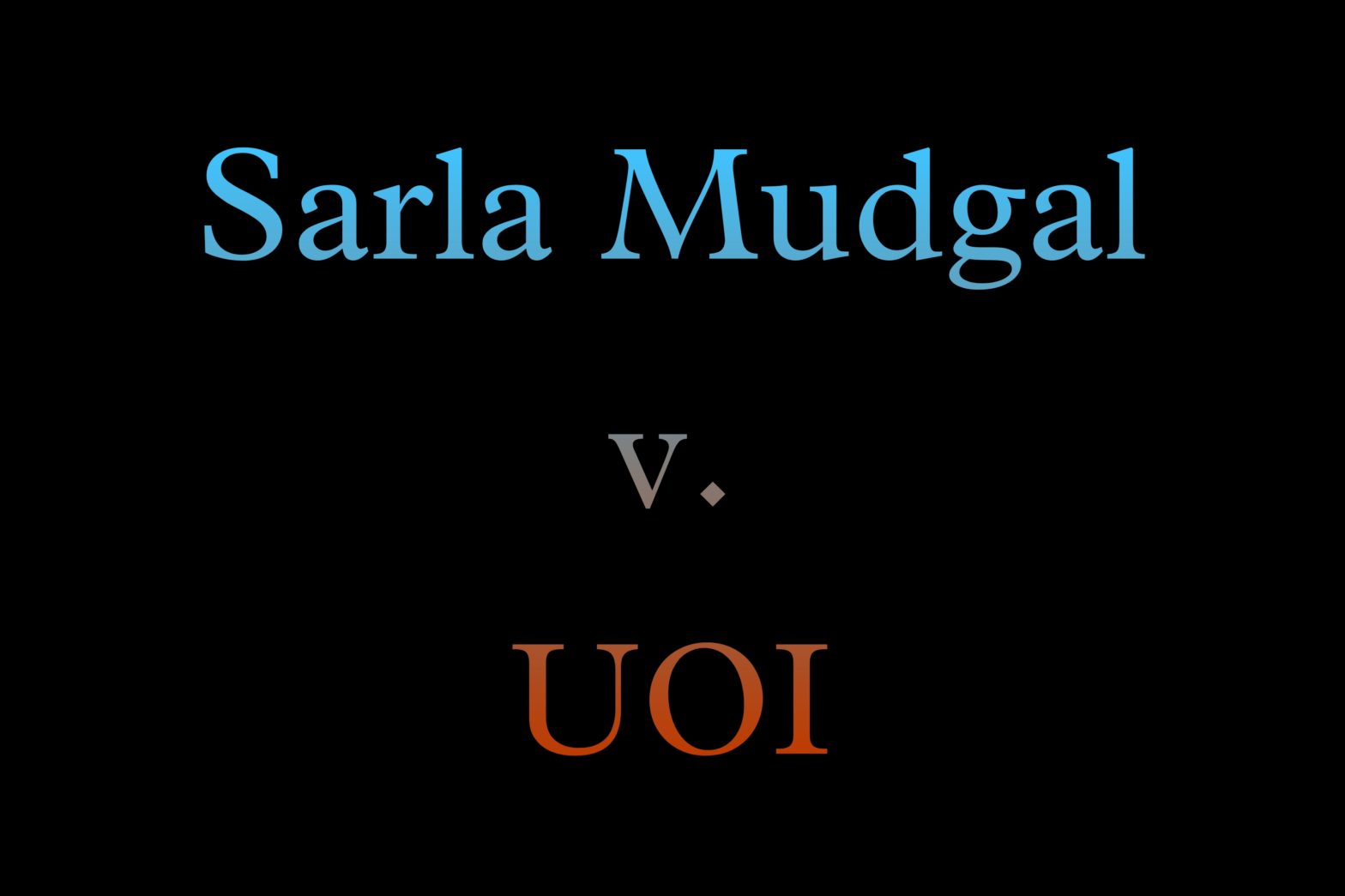Title of case :Sarla Mudgal, President, Kalyani and Ors. Vs. Union of India (UOI) and Ors.
Citation: AIR 1995 SC 1531
Bench: Kuldip Singh and R.M. Sahai
Date Decided:10th May, 1995
Appellant: Sarla Mudgal, President, Kalyani and Ors.
Respondent: Union of India and Ors
Facts
Under Article 32 of the Indian Constitution four petitions were filed in the Supreme Court that were heard together.
- The first petition was writ petition 1079/89. There were two petitioners. Petitioner No 1, Sarla Mudgal, President, of KALYANI – a registered Society, which works for the welfare of needy families and women in distress.
Petitioner No2, Meena Mathur married to Jitendar Mathur on 27 Feb 1978. Three children ( two sons and one daughter) were born out of the marriage. In early 1988, Petitioner got to know that her husband had solemnised second Marriage with Sunita Narula. They both Converted themselves to Islam and adopted Muslim religion. According to petitioner her husband had converted to Islam with the Purpose to solemnise second Marriage and to avoid the provision of Section 494 of IPC. Jitendar Mathur claim that he has adopted Islam which permit him to have four wives irrespective of the fact his first wife continues to be Hindu.
- The Second writ petition 347 of 1990 was filed by Jitendar Mathur Second wife Sunita alias Fathima. She argue that she alone with Jitendar Mathur adopted islam and thereafter they got married. A son was born to her from this marriage. She further states that after marrying her, Jitendar Mathur under the influence of his first wife gave an undertaking on 28 April,1988 that he has reverted back to Hinduism and had to maintain his wife and 3 children. Her complaint is that she continue to remain Muslim and not being maintained by her husband and has no protection under either of the personal law.
- The third writ Petition 424 was filed in 1992 by Geeta Rani who was married to Pradeep Kumar according to Hindu rites on 13 Nov 1988. In the petition she Pleaded that her husband used to mistreat her and onces beat her so badly that her jaw bones were broken. In Dec 1991, Petitioner learnt that Pradeep Kumar has converted into Islam and get married to Deepa. She stated that conversion to Islam was only for the purpose of facilitating Second marriage.
- Sushmita Ghosh is another lady who is the petitioner in Civil writ petition 509 of 1992. She was married to G.S Ghose according to Hindu rites on 10 May 1984. On 20 April 1992, her husband told her that he no longer wanted to live with her and she should agree to divorce him by mutual consent. The petitioner was shocked and prayed that she was his legally wedded wife and want to live with him and as such question of divorce does not arise. Finally, the husband told her that he had adopted Islam and would soon marry Vinita Gupta. He had obtained a certificate from Qazi dated 17 June 1992, indicating that he has adopted Islam. In the writ petition, the petitioner prayed that her husband should be restrained from entering into a second marriage with Vinita Gupta.
Issues
- Whether a Hindu husband, married under Hindu law, by converting into Islam, can solemnise a second marriage?
- Whether such a marriage without having the first marriage dissolved under law, would be a valid marriage qua the first wife who continues to be Hindu?
- Whether the apostate husband would be guilty of the offence under Section 494 of the IPC?
Holding

The Division Bench of the Supreme Court held that Hindu Marriage solemnised under the Hindu Marriage Act can only be dissolved on the ground mentioned Under Section 13 of the Hindu Marriage Act. And until the first Marriage has been dissolved none of the spouses can contract a second marriage. Court Further said that conversion to Islam and marrying again does not dissolve the first Hindu Marriage by itself. And therefore the Second Marriage soleminised after conversion will be considered void and illegal and the husband is guilty of an offence under Section 494 of IPC.
The Court also recommended the need for a uniform civil code in the Indian legal system that will stop Indians from trespassing in the personal law of one another. The court directed the Government of India through the Secretary of the ministry of law and justice, to file an affidavit regarding the steps taken by the government towards securing a Uniform civil code for the citizens of India.
Rationale
The reason given by Court, in this case, is, when marriage is solemnised under the Hindu Marriage Act of 1995, certain rights and statuses are possessed by both the partners, if one is allowed to dissolve the marriage by adopting a new personal law, it would demolish the existing right of the spouse who continues to be Hindu. And therefore this practice must not be allowed. The court referred to the Judgement of Robasa Khanum v. Khodadad Irani case and held that such marriage is violative of justice, equity, and good conscience.
